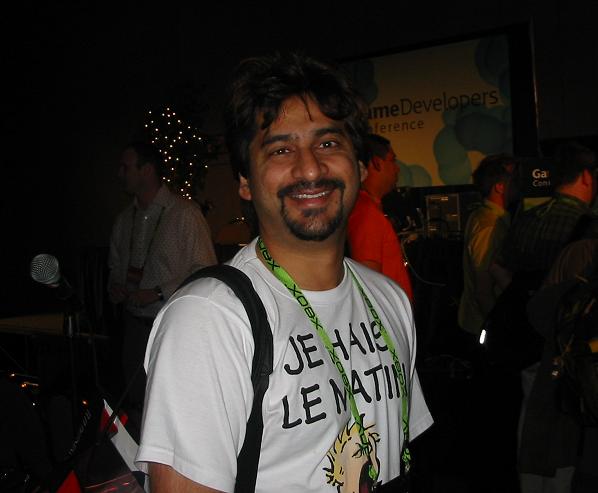
Here's the man himself!
When they're not spending time posing and shmoozing, Art Currim and his
company, Black Powder Media, look busy creating cinematics and audio
assets for the video game industry. Their credits include Shiny/Atari's
Enter the Matrix, EA's Freedom Fighters, and several other best-selling
games. They can be found on the web at
www.blackpowdermedia.com.
Art is always happy to answer questions and offer advice -
email him at
art@blackpowdermedia.com.
Q: Would you mind telling our readers who you are and what your role is, within the industry?
AC: Sure, I’m a freelance contractor and media consultant for the video game industry, specializing in audio-video design and production. This includes cinematic production, voice-over, sound design and motion-capture services. Prior to the video game industry, I spent several years in film/television production and post production, so I’ve been able to contribute much by way of narrative and character enhancement to my projects.
Q: How was working on a big budget title like enter the matrix as opposed to the smaller projects?
AC: The big budget project demands uncommon amounts of patience, dedication and sacrifice from all who are involved with it - basically one needs or develops nerves of steel. There are many, many considerations, and much by way of expectations – both one’s own as well as of one’s colleagues and the gaming community in general. Then there are schedule changes, design changes, etc. You are called upon to do uncommon things - on Enter the Matrix, for example, I spent almost 5 months in Sydney, Australia, supervising the ADR, facial capture and primary character VO recording. It was great fun, and a lot of hard work – can get disorienting though, waking up each day in a hotel room, driving on the wrong side of the street, kangaroo burgers for lunch, etc! The Aussie people are great though, so hospitable and sunny :)
The smaller projects are usually more about getting a lot done with limited resources, so there’s a lot of maximizing the allocation of resources and funds. On the other hand, there tends to be much more freedom for creative license, so it all evens out!
Q: What’s the most exciting thing about audio game development?
AC: Well everything. We get to be in video games, which is pretty exciting, whoever you talk to, they want to know what you’re working on and what the latest thing is, you know games themselves are such an amazing combination of entertainment and technology and there’s so many intelligent, talented and wonderful people working in our industry, and really a refreshing lack of egos. There’s always something new and there’s always something coming up to beat the last greatest thing, it’s cool and it’s intense. For example, all we have to do is look around us – the GDC is a key place where you will see this kind of experience. Everybody is coming up with the latest and greatest and two months later we’ll see how it all plays out in the new game offerings at E3. (All this) means that we as game audio developers have to keep abreast and ahead of technology, and the best way to do that is to just be involved, you know, read and play and talk to people, learn from other people’s mistakes and come up with new ideas of your own. Trial and error is a big part of it, and you have to really pour your heart into the game. I put a lot of passion into my job, If I’m doing something I really enjoy it and if I’m directing an actor for voice, I’m there with them, I want them to be the character… I want them to inhabit the role. You design every sound effect thinking what impact it will have in the game and what effect it’s going to have on the player. You really need to give it everything you have, because that’s our industry. Too often this has a major impact on your personal and your family life, so you could say its exploitative and it probably is, but then we are making and breaking new boundaries all the time. So it’s all fun really, it’s all-tremendous fun and the people are so good, working is like playing, and playing is like working.
Q: What are the biggest challenges about being an audio contractor?
AC: Having been in the picture both from within the developers’ team as well as outside the developers’ team, there are certain advantages that each position offers. When you’re outside the development team, you’re in the position to really provide your specialized abilities to a given project. And then that’s what you’re doing all the time because, every project you do informs and advises the projects you do after that. And you’re building experience and it really ends up that you’re getting more specialized and acquiring so much knowledge and experience. I think oftentimes, as a contractor, I’ve felt that I’ve done a lot more for the games I’ve worked on. I’ve been able to draw elements from everything that I see and do and hear and am involved in. By that very same token, the challenges that you’ve got within the team, you know little details like how the audio tools are developed or the right amount of attention to be paid earlier on in the game development process - often don’t get the justice they should. You often feel like, ‘Hey if only I’d been involved 6 months earlier, I could have come up with some ideas or helped the process or made things much easier in this particular segment of the game’. You know the day-to-day interaction is also very valuable. That said there is a definite effort from Sony and from Microsoft’s Xbox development team, the major console manufacturers as well as middleware developers, to provide standardized tools and software programs that help audio/music/content designers semi-independently implement audio and help enrich the video game. It’s a subjective statement, but they say audio is about 1/3 of the experience of the video game, and to that extent there is so much that we can do to make the game sound better and for very cheap I might add. But you know it’s always highly advisable, whether you have a sound guy who is part of the development team or a contractor, to get the audio guy involved at the earliest possible stage. And use their knowledge and experience and their creative input and ability just as you would that of an art director or art lead. You know the sound guy is able to give you just the same enrichment for a project. So get them involved early, keep them part of the loop on the process, and give them the tools they need to make your game better.
Q: Who do you interact most with as an Audio Game Developer?
AC: Well, it depends on the individual projects and individual teams and their approach, and where you’re getting involved. But the typical process of involvement, at one level you’re involved with the publisher because that’s who you do the business with, that’s who you make the contracts with, and that’s how you establish the parameters of what you’re going to be doing and how you’re going to be paid and over what period of time. You interact with the producer, because the producers are involved more closely on a cost basis and day-to-day basis as to what exactly you’re producing for them and when you’re going to have it ready for them to have implemented into the game. A lot of times a producer will also take on more of a creative involvement in the game, they may be present for session, and they’ll be in a position to approve or suggest changes. Beyond that you’re dealing also with the designers. Very closely with designers, especially when it comes to voice-overs and stuff. And sometimes there will be a scriptwriter involved with the game, but usually a designer does a lot of the initial dialog, and setting up of the characters and things like that. A lot of times they have a very clear idea of how they want the sound effects to work. Then the next person you’re in touch with a lot is the audio programmers. Because they’re building specific tools for the developer or for the project at hand, which you use to implement the audio and insert it into the game. You know, make it audible and give it surround sound effects and all the interactivity and all those fancy things that go into video games. So you’re dealing with a lot of people really, as a sound person. More I think than any other outside contractor, well at least that I know of. You know, more than motion capture, things like that. If you’re working cinematics, you might have a cinematic team, and they have specific requirements of the audio. Or they’ll have trailers or previews or demos for which they want the dialog, effects, and sound mix. Oftentimes they say ‘ Hey, listen. We need to get this mixed for our next commercial’ or for their E3 promo or whatever. So yeah, you’re dealing with a bunch of people.
